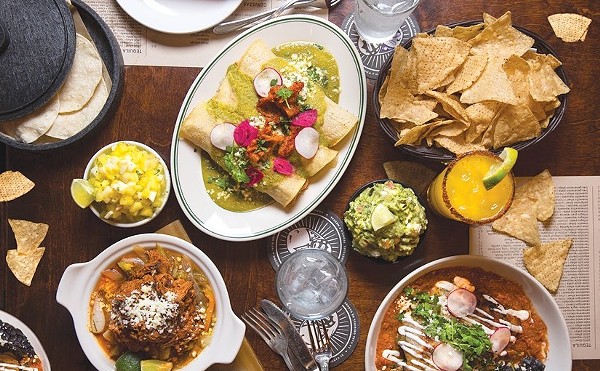"I was a big, fat, bloated miserable person. I looked like a mean-old Republican," Bryan Davis chuckles over a mug of coffee at the Root Café. These days, Davis, who's known as "Doc Fermento" to his Internet fanbase, looks more like a taut, punk rock Wolverine, replete with a double-crested mohawk.
Five years ago, Davis suffered a litany of health problems, from asthma to allergies to severe gastrointestinal disorders. "I was on proton pump inhibitors, Nexium, asthma medications, steroid inhalers, fast-acting inhalers, Claritin." His bowel issues were the biggest concern: "I couldn't go anywhere. I was always paranoid. I literally mapped out safe places to go to the bathroom."
Now all Davis takes are his homemade ferments—sauerkraut, kimchi, kefir and kombucha, among others. "All that stuff went away. It just went away. The fermented foods helped right away," he says of his former health struggles. While he concedes that supping on fermented foods isn't a wholesale solution to serious health disorders—"You can't just eat a standard American diet and throw down some sauerkraut," he warns—he considers his ferments the genesis of his profound lifestyle makeover.
Fermentation—loosely defined as the guided transformation of food by healthy bacterial or fungal cultures—isn't just a recent health trend touted by detox-ier-than-thou yoga moms, raw vegans with chunky bangs and Fjällräven backpacks, or hip stay-at-home dads like Davis: it represents the apotheosis of culinary heritage worldwide. Long before canning (itself a lost art eclipsed by Hamburger Helper and frozen vegetable medleys) pervaded Midwestern kitchens, our ancestors preserved produce, grains, meat and dairy by fermenting, which retains (and in many cases enhances) their nutritional compounds, not to mention their flavor.
"Every gourmet food known is fermented," asserts Davis. "Sausage, coffee, cheese, chocolate, bread, beer—everything." While these foods boast the tasty trademark tang imparted by fermentation, many are heat-treated or pasteurized at some point, which compromises their nutritive value. Raw ferments—like homemade sauerkraut, yogurt, and kombucha—provide both spectacular flavor and beneficial bacteria that suppress pathogens and diversify and improve the microflora in the human digestive system.
More intangibly, many fermentation revivalists revere what Davis calls "the funk" of fermentation, referring to both its taste and its gritty, hands-on—and yes, ultra-locavore--ethos. This stuff is alive, its dynamic microbial content constantly changing, often demanding human interaction to shepherd its evolution. "It's alive!" is an oft-invoked joke among fermentation junkies, a cheeky nod to monster movies as well as a gleeful affirmation of the thriving probiotic colonies in fermented concoctions.
Consider a jar of brewing kombucha, a vinegary fermented tisane: the liquid tea substrate is striated with fleshy bacterial sediment and topped with a shaggy, slimy disc of live kombucha culture, delphically referred to by fermentation enthusiasts as "the mother." Definitely funky.
In a cavernous storage closet at the back of Ms. Julie's Kitchen, a vegetarian restaurant in a nondescript South Akron shopping plaza, Bill Bond, known around town as "Bucha Bill," tends 12 huge jars of his beloved eponymous beverage. The offspring cultures of his original kombucha mother, now in its 250th generation, bob and froth happily in their respective reservoirs as he loosens a white cloth draped over one of the jars to show off its contents.
Bond, a wiry 29-year-old massage therapist with Winterfresh-blue eyes and tawny, lustrous hair tucked into a loose ponytail (his "witchy" haircare secret is homemade kombucha shampoo) started home fermenting six years ago to combat chronic digestion issues.
Three years after he began religiously brewing and drinking it, Bond approached his more straitlaced, business-savvy brother-in-law Mark Slyder about bottling and selling the tonic elixir he'd become so obsessed with.
"When he first came to me, I was like, 'You wanna do what?'" Slyder recalls. "It's like trying beer for the first time. You try it and you're like, 'What in the...you actually like this stuff?' And then the next day, you're like, 'Man, that watermelon jalapeño's really got me...'"
Bond's company has come a long way since he scavenged for empty Corona bottles behind bars to contain the bubbly 'buch overflowing his swollen fermenting vats. After years of tinkering with proportions, ingredients, and brew times, Bond finally has achieved his holy grail: "Strong kombucha with little to no remaining sugar that isn't watered down with high-glycemic fruit juices," the latter a common practice among the big-batch national kombucha companies.
The company now has its own bottles and a custom label Bond describes as "Deco apothecary." As of last month, Bucha Bill's distribution has expanded to Cleveland, with his beverages available at The Root Café, Good 'n Raw, and Luxe Kitchen. Bill and Mark also are in negotiations with Whole Foods and Mustard Seed Market. While their current production level is about 1,000 bottles a month, they plan to double that output next year.
Bucha Bill's isn't the only small-batch fermentation business taking off locally. Molly Murray and her father Pat, both inveterate community gardeners, recently launched Wake Robin Fermented Foods, whose three flagship products—traditional German sauerkraut, kimchi, and a Mexican-style carrot-jalapeño pickle—soon will be available at the Root and Annemarie's Dairy at the West Side Market.
Operating out of a retrofitted sausage factory in the historic Hildebrandt building in Clark-Fulton, Wake Robin seeks to re-localize and celebrate forgotten fermented foodways by adopting classic recipes and regional products. With spices from local dry foods company Chef Cube, jars from Cleveland Bottle, labels from Jakprints, and organic produce from Green Field Farms in Wooster, the Murrays hope to provide a thoroughly local product that hearkens back to the sparkly zing of cellar-fermented cabbage enjoyed by Northeast Ohio's first European settlers.
"I have these big ol' grand epiphanies sometimes while I'm fermenting," says Bucha Bill. "This interface of life is what we're doing in a big, metaphysical sense—I love doing something that relates to how we evolved and is itself an evolution. Life comes from ferment."









